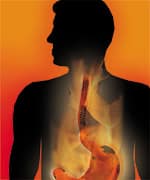Life Extension Magazine®
| Q: My doctor says my heartburn symptoms, including burning discomfort in the throat and an acid taste in my mouth, are caused by gastro-esophageal reflux disease (GERD). What exactly causes GERD, and is it dangerous? A: Commonly referred to as heartburn, GERD is a chronic condition caused by the backflow of acid, bile, enzymes, and food into the esophagus. Virtually everyone has experienced at least the occasional discomfort in the chest or throat and the sour taste in the mouth caused by this reflux process.
GERD can be triggered by overeating, consuming certain types of foods and beverages, and lying down too soon after eating. Often GERD occurs because the valve between the lower end of the esophagus and the stomach—called the lower esophageal sphincter—fails to close properly, allowing the stomach’s contents to be regurgitated into the esophagus and throat. When these symptoms occur two or more times a week and become difficult to control, they are diagnosed as GERD.1 The real danger of GERD is that over time, refluxed stomach acid can erode or cause ulcerations in the lining of the esophagus. Some GERD sufferers develop scar tissue, which narrows the esophagus and can make swallowing food difficult. People with GERD also are at higher risk of developing Barrett’s esophagus—severe damage to the esophageal lining, which is linked to an increased risk of developing esophageal cancer.1,2 Q: Why is the diagnosis of GERD becoming so common? Did people simply ignore symptoms in the past, or are more people suffering from GERD than before? A: As many as 25 million Americans now suffer chronic and potentially dangerous GERD. In the past 20 years or so, we have been better able to understand the natural history of GERD and its complications, while advances in technology now allow doctors to more easily diagnose the disease. For example, a method called fiber-optic endoscopy, in which the patient swallows a tube containing an optical system that visualizes the lining of the upper gastrointestinal tract, has opened up a new world with regard to the diagnosis, biopsy, treatment, and follow-up of GERD. Furthermore, more people are aware of treatment options for GERD, thanks in part to advertising campaigns and the availability of effective over-the-counter GERD medications. Q: Are there any dietary or lifestyle factors that contribute to the increasing prevalence of GERD? A: Several factors can contribute to an individual’s susceptibility to developing the symptoms of GERD. Some people, for example, develop heartburn whenever they eat spicy foods. Others seem to be able to tolerate any kind of food without developing heartburn. Tobacco use can increase the tendency to develop GERD symptoms, as can being overweight. A genetic component may also be involved in GERD.
Q: Why does being overweight contribute to GERD? A: Think about having a 50-pound child standing on your stomach. That extra weight increases the pressure on your stomach. When you have a roll of fat tissue on your abdomen, it pushes down on your abdominal contents in a similar way, applying pressure to the lower esophageal sphincter. As a result of this pressure, the lower esophageal sphincter is no longer able to perform its job of keeping the stomach contents from escaping into the esophagus. As it opens, partially digested foods and stomach acid are pushed up from the stomach to the esophagus, leading to the symptoms of GERD. Q: What are the most common treatments for GERD? A: Antacids such as Tums® and Maalox® were once the first line of treatment. These simple mineral salts neutralize stomach acid, and are still in use today. After antacids, H2 blockers (such as Zantac® and Tagamet®) became available. These medications block the action of histamine, which normally stimulates stomach acid secretion. Many individuals still find that H2 blockers effectively manage their symptoms. H2 blockers were followed by the introduction of proton-pump inhibitors such as Prilosec®. These medicines block the secretion of digestive acids by proton pumps in the stomach’s lining. While proton-pump inhibitors often work better than antacids or H2 blockers, their efficacy is often patient-specific, and can depend on how dedicated the patient is to using them in combination with dietary and lifestyle modifications. Q: What dietary and lifestyle issues are most important in helping to manage the symptoms of GERD? A: Basically, if a food triggers your symptoms, you should avoid it. If you get heartburn symptoms when you eat jalapeño peppers, then you really should avoid them. A critical overall factor for GERD patients is to stop smoking. The nicotine in cigarettes acts as a vasoconstrictor to decrease blood flow to the stomach lining. This increases the risk of stomach and esophageal ulcers, and increases acid production. In essence, if you continue to smoke, you are actively reversing everything you are trying to accomplish by taking GERD medications—in addition to increasing your risk for illnesses such as cancer and heart disease. Q: Since medications for treating GERD work by blocking stomach acid, do they also affect digestive function or nutritional status? A: Yes, they can. Stomach acid is there for a reason—it plays an important role in the digestion of certain types of food, especially protein. It is also important in the absorption of minerals such as iron. Prescription drugs and over-the-counter medications that limit or neutralize the stomach acid that causes GERD can thus interfere with the normal absorption of vitamins and minerals, and they can inhibit the digestion of food.3,4 Thus, suppressing stomach acid too strongly can occasionally produce some adverse effects. Q: Can proton-pump inhibitors be used over the long term? A: Under a physician’s care, many people successfully use them for many months or years. Since drugs like Prilosec® are sold over the counter, I am concerned that patients may use them at length to relieve their GERD symptoms, while failing to realize the underlying causes or consequences of their condition. For example, people may not realize that stomach acid has damaged their esophagus, which can lead to bleeding, esophageal ulcers, esophageal strictures, and even to tissue changes that can precede esophageal cancer. Thus, GERD symptoms that last longer than two to eight weeks should always be evaluated by a physician. Q: Is there any danger associated with taking proton-pump inhibitors for a year or more? A: I think those medications are generally safe, as long as they are used under a physician’s supervision. Physicians and patients should note, however, that a recent study showed that adults over the age of 50 who used proton-pump inhibitors for a year or longer experienced a 44% increased risk of hip fractures. Long-term use of H2 blockers also increased the risk of hip fracture, but to a lesser degree.5 Q: Are there any natural remedies that effectively manage the symptoms of gastroesophageal distress? A: Yes. As Life Extension readers may know, d-limonene is an extremely promising natural remedy for managing the symptoms of chronic heartburn and GERD. Derived from the citrus oil contained in orange peel, d-limonene produces fast-acting yet long-lasting relief of the symptoms of gastric distress.
In clinical studies, distilled and purified d-limonene has demonstrated an impressive ability not only to reduce heartburn symptoms, but also to resolve them completely for six months or longer, following a period of treatment as brief as 14 days.6 In one recent trial, approximately 90% of the participants reported complete resolution of their heartburn symptoms just two weeks after beginning supplementation with the orange peel extract.6 The controlled, double-blind second phase of the study showed that those taking orange peel extract experienced a dramatic decrease in the severity of their heartburn symptoms. At the end of the two-week trial period, 83% of those who supplemented with orange peel extract rated their heartburn symptoms no higher than 2 on a scale of 1 (least severe) to 10 (most severe). By comparison, only 30% of the placebo group experienced such benefits. At the end of 20 days, 75% of those taking d-limonene reported relief from heartburn symptoms, compared to only 20% of the subjects who took placebo. No one in the study reported any adverse side effects.6 Q: What experience do you have with d-limonene in the treatment of GERD? A: D-limonene manages symptoms of GERD in most people, and does so in very short order. Just a limited number of doses—some times as few as two or three—can relieve symptoms for a sustained period of time. Additionally, research has demonstrated that d-limonene has many biochemical properties that may help guard against cancer and other diseases.7 Another advantage of d-limonene is that it has not been associated with the nutrient deficiencies or impaired digestive function that accompany some acid-blocking drugs. Overall, I think it is a good choice for most people experiencing their first symptoms of GERD. Q: Do you suggest d-limonene to all your GERD patients? A: Generally yes, though it depends on particular issues experienced by each patient. Since d-limonene offers quick, lasting relief and is a safe, naturally occurring remedy, I want to offer it to patients with GERD symptoms whenever possible. Q: Do you sometimes recommend both proton-pump inhibitors and d-limonene?
A: Typically I recommend one or the other. I like to keep things simple, and so do my patients. If my patients use both, it can be difficult for me to determine which therapy is offering the relief. If GERD symptoms are relatively mild, I prefer to begin with d-limonene, since it involves only a brief, finite course of therapy. If patients can achieve effective symptomatic relief from d-limonene, then I think we are way ahead of the game. Q: What dosage of d-limonene you normally recommend? A: Normally, I recommend one 1000-mg capsule, every other day, for 20 days, or a total of 10 doses. Of all the over-the-counter medications available to patients, d-limonene is certainly number one on my list. It gives the patients quicker, longer-lasting relief than most anything else, and it is extremely safe. Roger C. Willette, MD, is an internal medicine specialist in Houston, Texas. Dr. Willette has conducted clinical trials of natural remedies in the management of gastroesophageal symptoms. | ||||
| References | ||||
| 1. Available at http://healthinfo.cedars-sinai.edu/library/healthguide/en-us/illnessconditions/topic.asp?hwid=hw99177. Accessed February 6, 2007. 2. Eckardt VF, Kanzler G, Bernhard G. Life expectancy and cancer risk in patients with Barrett’s esophagus: a prospective controlled investigation. Am J Med. 2001 Jul;111(1):33-7. 3. Reinke CM, Breitkreutz J, Leuenberger H. Aluminum in over-the-counter drugs: risks outweigh benefits? Drug Saf. 2003;26(14):1011-25. 4. Waldum HL, Brenna E, Kleveland PM, Sandvik AK, Syversen U. Review article: the use of gastric acid-inhibitory drugs—physiological and pathophysiological considerations. Aliment Pharmacol Ther. 1993 Dec;7(6):589-96. 5. Yang YX, Lewis JD, Epstein S, Metz DC. Long-term proton pump inhibitor therapy and risk of hip fracture. JAMA. 2006 Dec 27;296(24):2947-53. 6. Willette RC, Barrow L, Doster R, Wilkins J, Wilkins JS, Heggers JP. Purified d-limonene: an effective agent for the relief of occasional symptoms of heartburn. Proprietary study. WRC Laboratories, Inc. Galveston, TX. 7. Nakaizumi A, Baba M, Uehara H, Iishi H, Tatsuta M. d-Limonene inhibits N-nitrosobis (2-oxopropyl)amine induced hamster pancreatic carcinogenesis. Cancer Lett. 1997 Jul 15;117(1):99-103. |




